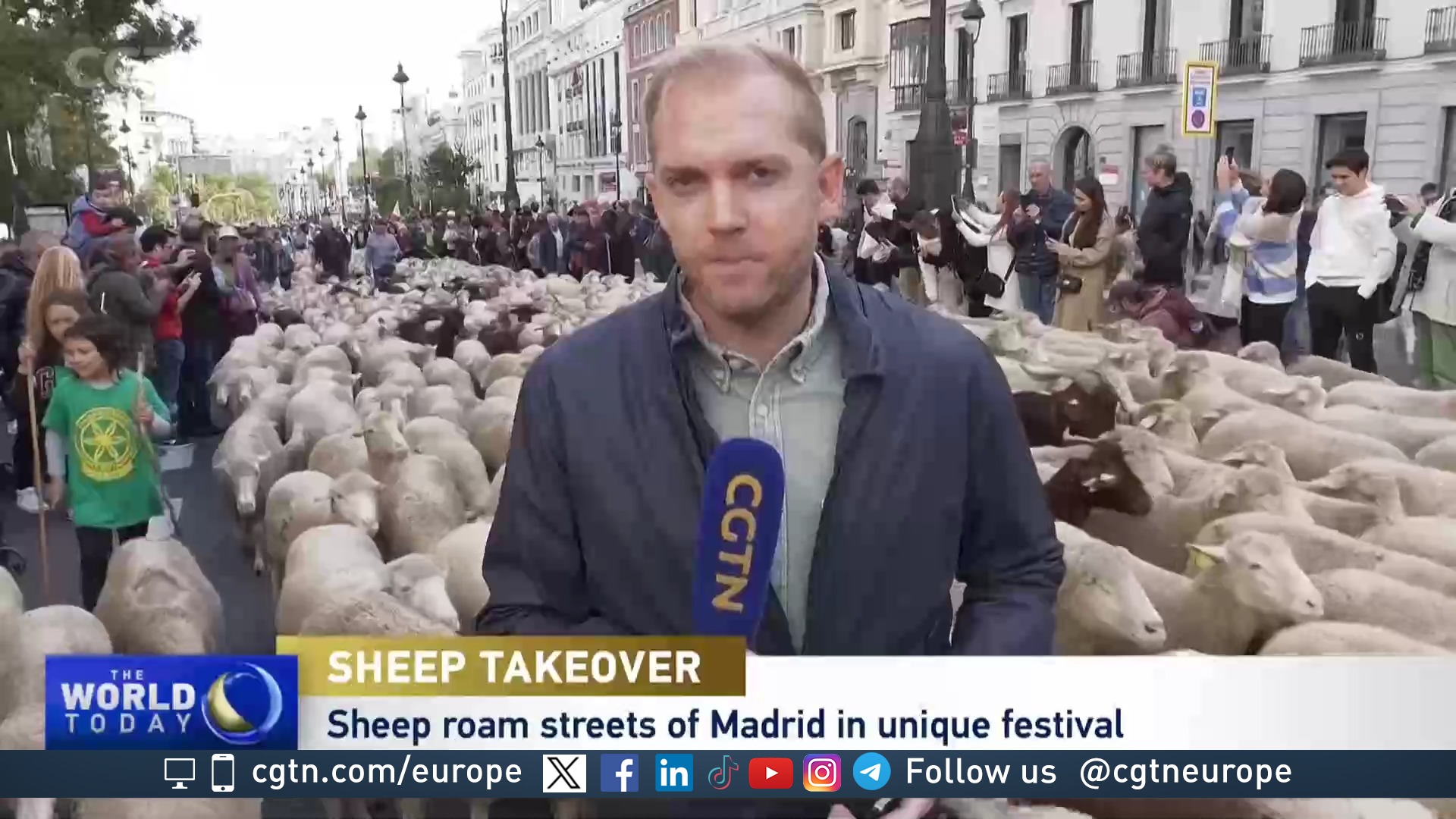01:52

You could be forgiven for feeling a little sheepish in Madrid on Sunday as over a thousand sheep took to the streets of the Spanish capital to claim their rights as part of a medieval tradition that dates back to the 1400s.
This ovine invasion was part of the 'Fiesta de la Transhumancia', or the Trashumance Festival, an annual celebration of an ancient royal rite of passage granted by Spanish royalty to shepherds back in 1418. It allows shepherds to move their flocks from cool northern highlands in the summer to more southerly pastures for winter grazing.
This symbolic and folkloric tradition in Madrid has been happening since 1994. Usually a tourist and fashion capital, thousands of people lined the streets to see a very different kind of parade.

The Trashumance Festival is an annual celebration of an ancient royal rite of passage granted by Spanish royalty to shepherds in 1418. /Ken Browne/CGTN Europe
The Trashumance Festival is an annual celebration of an ancient royal rite of passage granted by Spanish royalty to shepherds in 1418. /Ken Browne/CGTN Europe
Many people did double-takes on the streets of Madrid as the sheep passed by. One tourist from Seattle in the U.S. could hardly believe what she was seeing: "It's crazy, I'd seen pictures of it before but actually being here and standing among sheep and goats in Puerto Del Sol is kind of nuts."
Another visitor from the States was equally impressed: "It's just incredible to see them go from one side of Madrid through downtown where's there's usually thousands and thousands of cars... It's kind of funny to see people with their expensive shoes, walking through the manure."

People did double takes as the sheep strolled through the streets of Madrid. /Ken Browne/CGTN Europe
People did double takes as the sheep strolled through the streets of Madrid. /Ken Browne/CGTN Europe
There is a serious element to the day's fun too. One shepherd, Jose Luis, tells CGTN that "the sheep eat the pasture reducing the risk of wildfires, nowadays the routes through the mountains and pastures are abandoned."
This march is also a stand by rural communities who see their way of life slowly disappearing as part of the Espana vacío or 'Empty Spain.'
"We fear for the future," continues Luis. "You don't find many shepherds anymore, before you could even find them sleeping in the wild in the mountains, but nowadays there are fewer and fewer of us."
Madrid has always been part of the 125,000 km grid of farming paths that cover the Iberian Peninsula, but many are now unused. According to Luis, no-one wants this job: "Young people want easy money, they don't want to work with sheep for 24 hours, they want to work eight hours then go home and forget about everything. For a shepherd you have to take care of your flock 24 hours a day."
Female shepherds and the future
While most of the shepherds seen passing through Madrid are male, there's also an important role played by women says Marity Gonzalez, the director of projects of the Transhumance and Nature Association. She's also the first woman to be granted the honor of guiding the flock through the center in this 30-year-old festival.
"Even if you don't see us, we’re here," says Gonzalez, also assuring the future of the trade thanks to families that pass traditions down through generations. "Kids who choose to work with livestock are happy because they feel free in the countryside, able to do something they like."

The sheep march also represents a stand by rural communities who are seeing their way of life slowly disappear. /Ken Browne/CGTN Europe
The sheep march also represents a stand by rural communities who are seeing their way of life slowly disappear. /Ken Browne/CGTN Europe
"Being a shepherd has a future because, with the threat of climate change, it's the only way that herds can find pasture, roam and eat for free."
As the sheep pass the party starts behind – tambourines and drums bring the streets to life in a carnival of color, song and dance with castanets keeping time and women dressed in women in mantillas, customary head scarves, a flowing colourful skirts dance with men in a jota traditional dance.
Men pull out leather pouches full of wine and take a drink theatrically, stretching the stream of wine far from their mouths. Dancers perform on large wooden shoes with huge spikes, an homage to the pastors and the footwear they use in muddy fields.
The mayor of Madrid appears and the price of passing flocks through the city is paid: 50 maravedis in medieval Spanish currency, as stated in the 1418 agreement between the city and its shepherds.
Following the sheep are modern cleaning trucks, erasing the mess and the manure left behind – but while the festival moves on, this reminder of the importance of rural life, its people and its traditions remains.

Subscribe to Storyboard: A weekly newsletter bringing you the best of CGTN every Friday